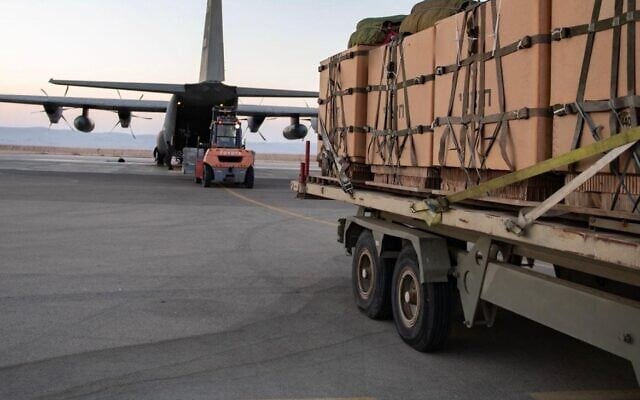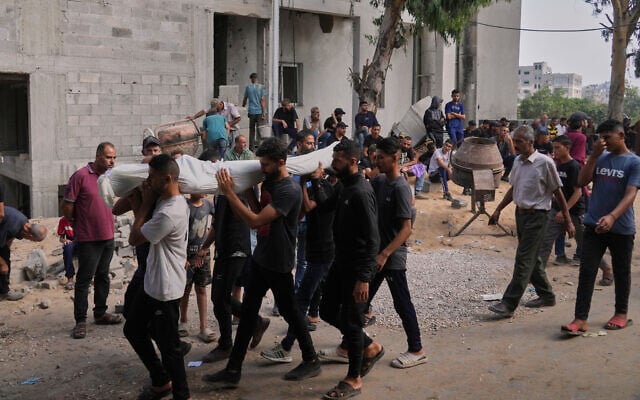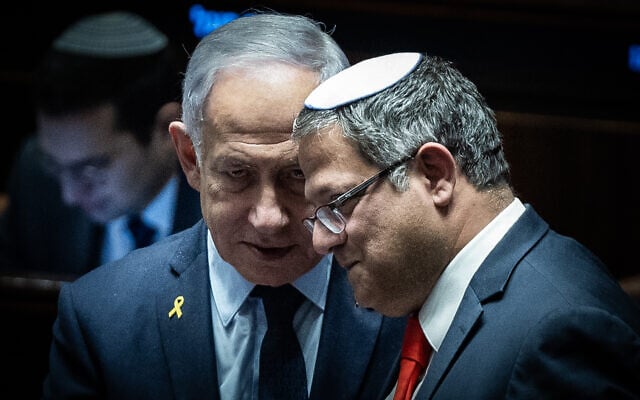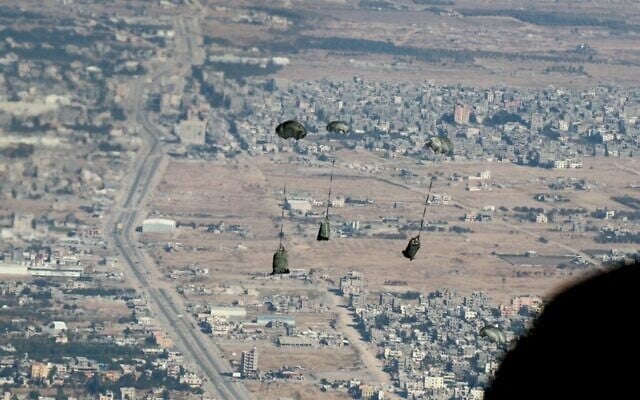Israel carried out its first airdrop of humanitarian aid into Gaza early Sunday, for the first time since the start of the ongoing war against Hamas, and pledged to halt fighting in certain parts of the Strip and create safe passages for the United Nations to distribute goods to the Palestinian population.
The series of announcements appeared to mark a shift under heavy international pressure for Jerusalem, which between March and May barred all aid from Gaza, and then supported distributing much of the assistance via private American contractors in designated areas — a mechanism that drew increasing backlash over reports of hundreds of aid-seekers being shot dead in near-daily incidents.
While Israel has consistently argued that it isn’t restricting aid distribution by the UN, the international body and humanitarian groups have been claiming Israeli restrictions prevent the goods from being handed out, with countries, groups and officials waging a growing pressure campaign for the Jewish state to allow more aid as hunger steadily grows in the war-battered enclave amid mounting reports of malnutrition-related deaths.
On Saturday evening, the Foreign Ministry said Israel would implement “humanitarian pauses” in densely populated areas and humanitarian corridors in Gaza starting Sunday morning, to enable the distribution of aid, shortly after the Israel Defense Forces said it was prepared to do so.
The IDF did not immediately provide an exact schedule or locations of the “pauses.” It earlier said it had been decided that “designated humanitarian corridors would be established to enable the safe movement of UN convoys delivering food and medicine to the population.”
“The IDF is prepared to implement humanitarian pauses in densely populated areas and will continue to operate to dismantle terrorist infrastructure and eliminate terrorists in the areas of activity,” it said.
Also Saturday evening, the military said it was planning the airdrop — consisting of seven packages of aid containing flour, sugar and canned food — adding this was among a “series of actions” aimed at improving the humanitarian situation in the Strip.
Hours later, the IDF said it had carried out the airdrop, providing video footage and stressing that the move was taken “in accordance with the directives of the political echelon.”
It was the first time Israel had airdropped aid into Gaza since the current war began, after previously having only allowed other countries to carry out such operations.
The IDF said the airdrop was conducted by the Israeli Air Force and Israel’s Coordinator of Government Activities in the Territories (COGAT), “in coordination with international aid organizations.”
Unusually, the latter, nighttime statement was only issued on the army’s English-language distribution list for journalists, and wasn’t immediately featured on its Hebrew channels.
In the earlier statement, the IDF said the airdropped aid was to be provided by international organizations, and that its goal was also to refute the “false claim of deliberate starvation in the Gaza Strip.”
According to the IDF and COGAT, over 250 trucks of aid were unloaded at the Kerem Shalom and Zikim crossings with Gaza this week, joining hundreds more trucks waiting to be collected by the UN and other international groups. In all, some 600 trucks’ worth of aid were collected and distributed in Gaza this week, according to COGAT’s figures.

“The IDF, through COGAT, will continue coordinating with international organizations to collect the contents of hundreds of trucks that have not yet been collected,” the military said.
In another effort, the military and COGAT said that in the Israel Electric Corporation had connected a power line from Israel to a desalination plant in the Strip’s south, which was expected to supply “approximately 20,000 cubic meters of water per day, up from the 2,000 cubic meters supplied until now, to serve about 900,000 residents in the area.”
“The IDF emphasizes that there is no starvation in the Gaza Strip; this is a false campaign promoted by Hamas. Responsibility for food distribution to the population in Gaza lies with the UN and international aid organizations. Therefore, the UN and international organizations are expected to improve the effectiveness of aid distribution and to ensure that the aid does not reach Hamas,” the statement continued.
“The IDF emphasizes that combat operations have not ceased. We will continue to operate in the Gaza Strip to return all hostages and to defeat the Hamas terrorist organization, both above and below ground,” the military added.

The boosted aid to the Strip was met with backlash from within Prime Minister Benjamin Netanyahu’s cabinet.
National Security Minister Itamar Ben Gvir said he was excluded from a phone call between Netanyahu and senior cabinet members on Saturday in which the moves had been decided.
He said that an official from the Prime Minister’s Office had told him after the fact that the reason he was excluded from the call, reportedly along with fellow far-right leader Finance Minister Bezalel Smotrich, was that the premier had not wanted to disturb him on Shabbat.
The ultranationalist lawmaker said he believed the real reason for his exclusion was his oft-vocalized opposition to sending humanitarian aid to Gaza in any capacity.
He contended that by increasing aid to Gaza, Israel was “surrendering to Hamas’s false campaign” of famine and starvation across the enclave, and was “endangering IDF soldiers.”
“The only way to win the war and return the hostages is to completely stop ‘humanitarian’ aid, occupy the entire Strip and encourage voluntary migration,” Ben Gvir said.

According to Ynet, the national security minister also told the PMO official that he knew Netanyahu “didn’t want to bring us into the conversation so that we wouldn’t be able to tell [him] what we think.”
The outlet said Ben Gvir also claimed that Hamas would “take advantage” of the decision to open humanitarian corridors that allow the UN to distribute aid safely across Gaza, and would operate within them.
“You didn’t include me in the conversation because you knew I was opposed,” he reportedly reiterated. “This is extremely serious.”
Some humanitarian chiefs are deeply skeptical that airdrops can deliver enough food to tackle the deepening hunger crisis facing Gaza’s more than two million inhabitants. They are instead demanding that Israel allow more overland convoys.
But British Prime Minister Keir Starmer backed the idea, vowing to work with Jordan to restart airdrops.
Starmer’s office said that in a call with his French and German counterparts, the “prime minister set out how the UK will also be taking forward plans to work with partners such as Jordan to airdrop aid and evacuate children requiring medical assistance.”
The United Arab Emirates said it would resume airdrops “immediately.”

“The humanitarian situation in Gaza has reached a critical and unprecedented level,” Foreign Minister Sheikh Abdullah bin Zayed Al Nahyan said in a post on X. “Airdrops are resuming once more, immediately.”
The decision to loosen the flow of aid came as the Hamas-run civil defense agency claimed over 50 Palestinians had been killed in Israeli strikes and shootings Saturday, some as they waited near aid distribution centers.
The war between Israel and Hamas broke out on October 7, 2023, when Hamas-led terrorists invaded Israel, killing some 1,200 people and kidnapping 251. The IDF has confirmed the deaths of 28 of the 50 remaining hostages.
The Hamas-run Gaza health ministry says more than 58,000 people in the Strip have been killed or are presumed dead in the fighting so far, though the toll cannot be verified and does not differentiate between civilians and fighters. Israel says it has killed some 20,000 combatants in battle as of January and another 1,600 terrorists inside Israel during the October 7 onslaught.
Israel’s toll in the ground offensive against Hamas in Gaza and in military operations along the border with the Strip stands at 456.
Israel has said it seeks to minimize civilian fatalities and stresses that Hamas uses Gaza’s civilians as human shields, fighting from civilian areas including homes, hospitals, schools and mosques.

